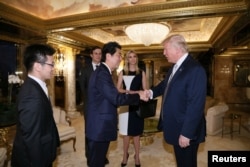Japanese Prime Minister Shinzo Abe will not apologize for his country's 1941 attack on Pearl Harbor when he visits the site on the U.S. island of Hawaii later this month, a representative said.
"The prime minister's visit is to show his commitment toward the future and to never repeat the tragedy of the world war, as well as to send a message of reconciliation between the U.S. and Japan," Chief Cabinet Secretary Yoshihide Suga said Tuesday.
This year marks the 75th anniversary of the attack that precipitated the American entry into World War II. Six months ago, U.S. President Barack Obama became the country's first sitting leader to visit a memorial in the Japanese city of Hiroshima, where in 1945 the United States detonated the world's first atomic bomb intending to end the war.
Abe is scheduled to visit Hawaii December 26-27 and go to the site with Obama, who spent part of his childhood in the state. "This visit is for the sake of consoling the souls of those who died in the war, not for the sake of an apology," Suga said.
Abe’s decision to visit Pearl Harbor has "a lot of support" within Japan, said Matthew Linley, a Nagoya University professor of international education.
Among Japanese, "many of them feel that relations now are completely normalized between the two countries," Linsley said. He noted "it was of course controversial for President Obama to visit Hiroshima and controversial for Prime Minister Abe to visit Pearl Harbor."
Eyes on Trump administration
He added that it is important to the Japanese government to forge good relations with President-elect Donald Trump. Abe was the first foreign leader to meet with Trump, during a visit to New York last month.
During his campaign, Trump at times criticized Japan and other nations where the U.S. plays a role in security and bases troops. Trump asserted that those governments should shoulder more of the cost.
Grant Newsham, a senior research fellow at the Japan Forum for Strategic Studies, said Trump's win in November "has really thrown the Japanese for a loop."
Candidate Trump’s statements “suggesting that Japan was not doing enough for its defense and not paying enough for the services effectively of U.S. forces really frightened the Japanese government," Newsham told VOA.
More than 2,300 U.S. servicemen were killed in the Japanese aerial attack at Pearl Harbor, which sunk the USS Arizona battleship while damaging or destroying 20 other ships and 164 planes. The attack will be marked Wednesday by a remembrance ceremony and a moment of silence at 7:55 a.m., when the Japanese planes first struck their targets.
Three and a half years later, the world war came to an end after the U.S. dropped atomic bombs on Hiroshima and Nagasaki, killing 210,000 people in the two attacks.
VOA’s Victor Beattie contributed to this report.





